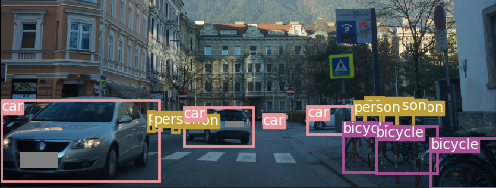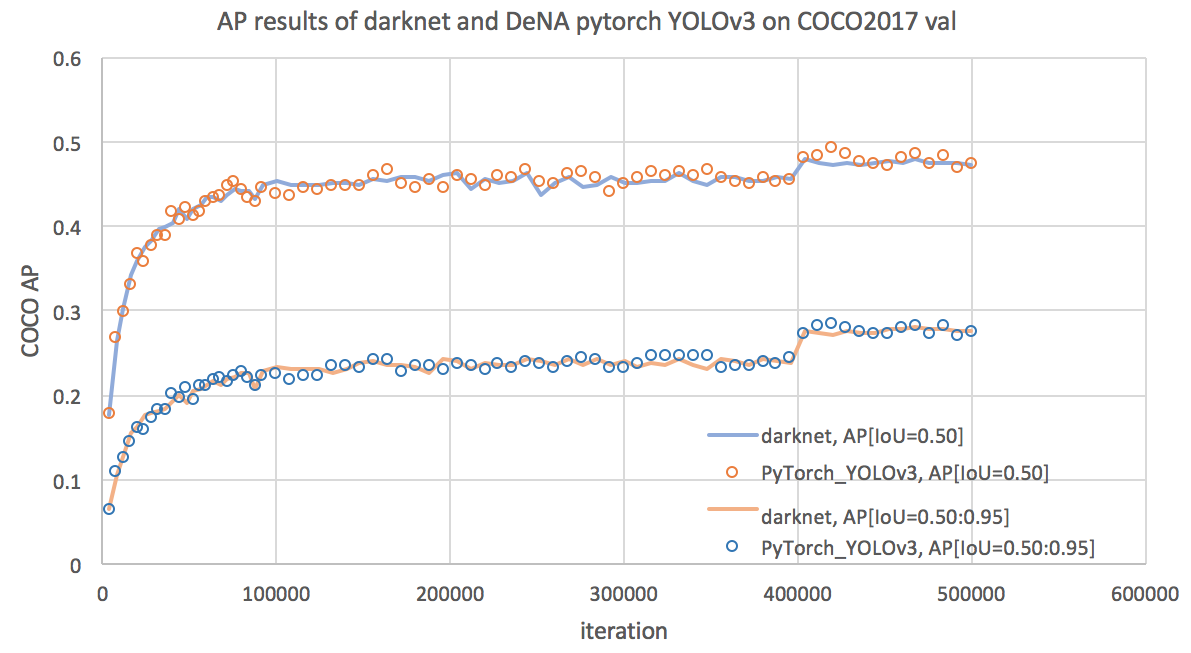Pytorch implementation of YOLOv3
- 19/05/05 We have verified that our repo exactly reproduces darknet's training using the default configuration, with COCO AP ~= 0.277 on train / val2017.
- 19/02/12 verified inference COCO AP [IoU=0.50:0.95] = 0.297 with val2017, 416x416, batchsize = 8 and w/o random distortion
- 18/11/27 COCO AP results of darknet (training) are reproduced with the same training conditions
- 18/11/20 verified inference COCO AP [IoU=0.50:0.95] = 0.302 (paper: 0.310), val5k, 416x416
- 18/11/20 verified inference COCO AP [IoU=0.50] = 0.544 (paper: 0.553), val5k, 416x416
| Original (darknet) | Ours (pytorch) | |
| COCO AP[IoU=0.50:0.95], inference | 0.310 | 0.302 |
| COCO AP[IoU=0.50], inference | 0.553 | 0.544 |
The benchmark results below have been obtained by training models for 500k iterations on the COCO 2017 train dataset using darknet repo and our repo. The models have been evaluated on the COCO 2017 val dataset using our repo.
- Our repo reproduces the results of the darknet repo exactly.
- The AP of the pretrained weights (yolov3.weights) cannot be reproduced by the default setting of the darknet repo.
| darknet weights | darknet repo | Ours (pytorch) | Ours (pytorch) | |
| batchsize | ?? | 4 | 4 | 8 |
| speed [iter/min](*) | ?? | 19.2 | 19.4 | 21.0 |
| COCO AP[IoU=0.50:0.95], training | 0.302 | 0.278 | 0.277 | 0.292 |
| COCO AP[IoU=0.50], training | 0.544 | 0.476 | 0.478 | 0.500 |
- Python 3.6+
- Numpy (verified as operable: 1.15.2)
- OpenCV
- Matplotlib
- Pytorch (verified as operable: v0.4.0, v1.0.0)
- Cython (verified as operable: v0.29.1)
- pycocotools (verified as operable: v2.0.0)
- Cuda (verified as operable: v9.0)
optional:
- tensorboard (>1.7.0)
- tensorboardX
- CuDNN (verified as operable: v7.0)
We provide a Dockerfile to build an environment that meets the above requirements.
# build docker image
$ nvidia-docker build -t yolov3-in-pytorch-image --build-arg UID=`id -u` -f docker/Dockerfile .
# create docker container and login bash
$ nvidia-docker run -it -v `pwd`:/work --name yolov3-in-pytorch-container yolov3-in-pytorch-image
docker@4d69df209f4a:/work$ python train.py --helpdownload the pretrained file from the author's project page:
$ mkdir weights
$ cd weights/
$ bash ../requirements/download_weights.shthe COCO dataset is downloaded and unzipped by:
$ bash requirements/getcoco.shTo detect objects in the sample image, just run:
$ python demo.py --image data/mountain.png --detect_thresh 0.5 --weights_path weights/yolov3.weightsTo run the demo using the non-interactive backend, add --background .
$ python train.py --help
usage: train.py [-h] [--cfg CFG] [--weights_path WEIGHTS_PATH] [--n_cpu N_CPU]
[--checkpoint_interval CHECKPOINT_INTERVAL]
[--eval_interval EVAL_INTERVAL] [--checkpoint CHECKPOINT]
[--checkpoint_dir CHECKPOINT_DIR] [--use_cuda USE_CUDA]
[--debug] [--tfboard TFBOARD]
optional arguments:
-h, --help show this help message and exit
--cfg CFG config file. see readme
--weights_path WEIGHTS_PATH
darknet weights file
--n_cpu N_CPU number of workers
--checkpoint_interval CHECKPOINT_INTERVAL
interval between saving checkpoints
--eval_interval EVAL_INTERVAL
interval between evaluations
--checkpoint CHECKPOINT
pytorch checkpoint file path
--checkpoint_dir CHECKPOINT_DIR
directory where checkpoint files are saved
--use_cuda USE_CUDA
--debug debug mode where only one image is trained
--tfboard TFBOARD tensorboard path for loggingexample:
$ python train.py --weights_path weights/darknet53.conv.74 --tfboard logThe train configuration is written in yaml files located in config folder. We use the following format:
MODEL:
TYPE: YOLOv3
BACKBONE: darknet53
ANCHORS: [[10, 13], [16, 30], [33, 23],
[30, 61], [62, 45], [59, 119],
[116, 90], [156, 198], [373, 326]] # the anchors used in the YOLO layers
ANCH_MASK: [[6, 7, 8], [3, 4, 5], [0, 1, 2]] # anchor filter for each YOLO layer
N_CLASSES: 80 # number of object classes
TRAIN:
LR: 0.001
MOMENTUM: 0.9
DECAY: 0.0005
BURN_IN: 1000 # duration (iters) for learning rate burn-in
MAXITER: 500000
STEPS: (400000, 450000) # lr-drop iter points
BATCHSIZE: 4
SUBDIVISION: 16 # num of minibatch inner-iterations
IMGSIZE: 608 # initial image size
LOSSTYPE: l2 # loss type for w, h
IGNORETHRE: 0.7 # IoU threshold for learning conf
AUGMENTATION: # data augmentation section only for training
RANDRESIZE: True # enable random resizing
JITTER: 0.3 # amplitude of jitter for resizing
RANDOM_PLACING: True # enable random placing
HUE: 0.1 # random distortion parameter
SATURATION: 1.5 # random distortion parameter
EXPOSURE: 1.5 # random distortion parameter
LRFLIP: True # enable horizontal flip
RANDOM_DISTORT: False # enable random distortion in HSV space
TEST:
CONFTHRE: 0.8 # not used
NMSTHRE: 0.45 # same as official darknet
IMGSIZE: 416 # this can be changed to measure acc-speed tradeoff
NUM_GPUS: 1
$ python train.py --cfg config/yolov3_eval.cfg --eval_interval 1 [--ckpt ckpt_path] [--weights_path weights_path]- Precision Evaluator (bbox, COCO metric)
- Modify the target builder
- Modify loss calculation
- Training Scheduler
- Weight initialization
- Augmentation : Resizing
- Augmentation : Jitter
- Augmentation : Flip
- Augmentation : Random Distortion
- Add the YOLOv3 Tiny Model
Joseph Redmon, Ali Farhadi
[Paper] [Original Implementation] [Author's Project Page]
@article{yolov3,
title={YOLOv3: An Incremental Improvement},
author={Redmon, Joseph and Farhadi, Ali},
journal = {arXiv},
year={2018}
}


